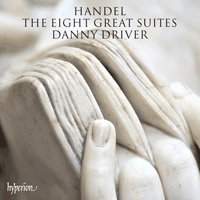Texte paru dans: / Appeared in:
*

International Record Review - (06//2014)
Pour
s'abonner / Subscription information
Hyperion
CDA68041/2

Code-barres / Barcode : 0034571280417
Reviewer: Nicholas
Salwey
Amongst the
pinnacles of keyboard music of the High Baroque, Handel’s Eight Great Suites
remain neglected as compared to Scarlatti’s sonatas or the wonders of Bach’s
vast oeuvre. It’s a rather similar situation with Bach’s Brandenburg
Concertos and Handel’s Concerti grossi: both are masterpieces of the genre
but Handel’s are so infinitely varied in terms of the number of movements,
their scoring and their style that they create a much less approachable
cycle: nevertheless it is one that yields very line results. Similarly,
amongst Handel’s suites are da camera works (dominated by dance movements),
as well as da chiesa ones (more contrapuntal in style), and then there are
the fantasia-type movements, full of flourishes and the French stil brisé,
and so free as to be wholly rhapsodic. Bach wrote such works, but he rarely
included them among his suites and partitas, which tend to follow a more
fixed pattern of movements.
Richter and Gavrilov are among the finest exponents of Handel’s suites, in performances that have stood the test , of time, but to modern ears they are slightly incisive and metallic in tone. Since then the Handel suites have appeared only rarely on disc, and it was wonderful to hear Angela Hewitt juxtaposing the first Bach Partita with Handel’s Suite No 8 in her recital programme several years ago. When performed with such commitment and expressive vitality, Handel’s suites are worthy to be placed alongside the finest, and these performances by Danny Driver are a welcome addition to the discography.
Driver’s repertoire is not short on variety, with twentieth-century neglected English works (York Bowen, Chisholm and Dale), as well as two fabulous recital discs of CPE Bach sonatas (reviewed in June 2010 and January 2013). The latter revealed to fine effect his impeccable technique, which is in abundant display here, with immaculate clarity of texture, neat and unfussy ornamentation, and with voice-leading all brought out to fine effect. Pedalling is largely inconspicuous and when used, it is done so very judiciously, as in the Fantasia movements, which call for maximum resonance and for the performer to exploit every nuance of available sonority, much in the manner of a free extemporization. By and large, though, it is the contrapuntal writing which is so demanding in these works, and Driver is faultless in maintaining every line. I could provide countless examples of his finesse but with some 50 movements to choose from, a few examples might seem too perfunctory.
What is so remarkable about these performances is the combination of textural clarity with the richness of tone afforded by Driver’s Steinway. He doesn’t play with the depth or the warmth of tone that one might use for later repertoire but nonetheless there is an expressive range which he employs through contrasting the thin treble registers with the more fulsome tenor and bass registers. He does so whilst retaining a light touch, with enough cantabile to maintain the line but still playing on the surface of the key. I feel sure that Handel would have been only too delighted with these results.
Perahia has recorded three and Hewitt two of the suites, together with the Chaconne (unlike Driver they omit the repeats in the latter, shaving off some three minutes) in couplings with sonatas by Scarlatti and Haydn respectively, and there is a palpable joy to the music-making of both of them. Driver comes out well, even when placed alongside such esteemed competition. His performances are perhaps slightly less characterized: Hewitt is the more introspective in the slower movements of the Second Suite and the more ebullient in the first of the two Allegros, with wonderfully pointed staccatos, but Driver’s rhythmic precision provides a much more cumulative performance of the closing fugal Allegro. Likewise in the F minor Suite No 8, the honours are evenly divided, with Driver again showing momentum where Hewitt prefers to linger for expressive purposes.
Meanwhile Perahia’s disc is simply one of those wonders of the piano discography which should be on everyone’s shelves, with the Chaconne, the Second, Third and Fifth Suites, and seven Scarlatti sonatas, all performed with total precision but with no loss of ardour: as he’s shown on countless discs, he is as at home in the High Baroque as he is in Mozart or Chopin. Were Perahia to record all the suites he would doubtless provide Driver with the sternest of competition (but I suspect this won’t happen).
If you want these performed on a harpsichord, then Richard Egarr’s recent set (reviewed above) is probably the obvious choice, but for those who prefer the piano, Driver provides the ideal alternative. It comes with fabulously eloquent notes from Richard Wigmore (in which every movement comes alive in his prose, a remarkable feat in itself) and a recording quality that captures every finest detail.
Cliquez l'un ou l'autre
bouton pour découvrir bien d'autres critiques de CD
Click either button for many other reviews


